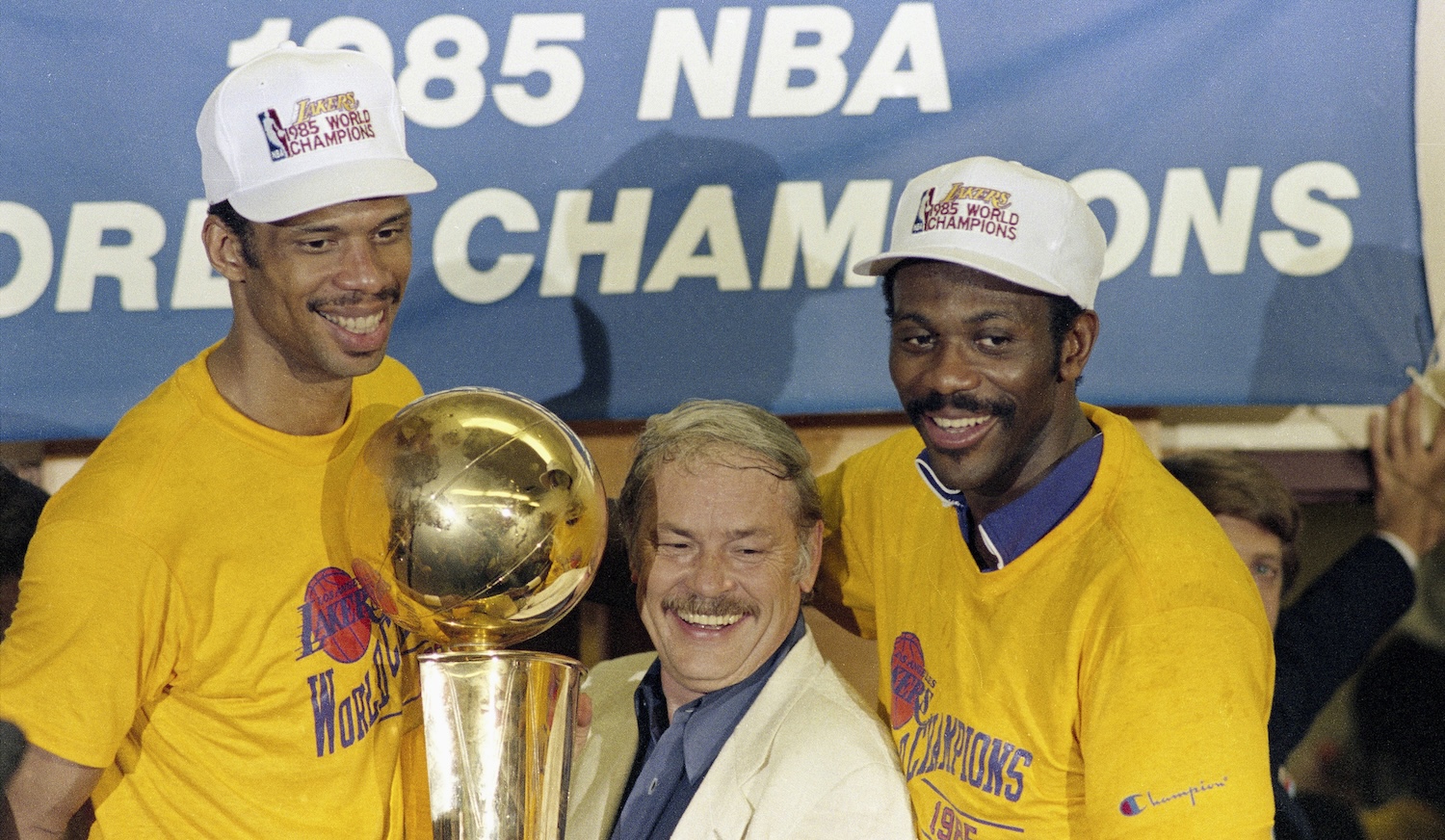For the first time in American sports history, a team has been sold on an 11-figure valuation. News broke Wednesday that the Buss family has agreed to sell a controlling share of Los Angeles Lakers to Mark Walter of TWG Global and Guggenheim Partners, in a deal valuing the franchise at $10 billion. That is the largest-ever valuation at sale for a North American sports franchise, smashing the high-water mark recently set by the private equity guy who agreed to buy the Boston Celtics for $6.1 billion. Walter taking over and doing so at such a steep price is obviously interesting, though the bigger story is the Buss family finally cashing out, as they were the flag-bearers for a type of sports owner that is quickly being bought out of the business.
Jerry Buss bought the Lakers, the NHL's Kings, and the Los Angeles Forum in 1979 for $67.5 million. At the time, that sale price was a record high for a team, and though sports teams are the sort of asset that always appreciate in value, few would have predicted that the valuation of the team would increase by 15,000 percent over the following 46 years. In that time period, the collective identity of NBA ownership steadily changed. The used car dealer who owned the Utah Jazz sold the team, through his widow, to a tech billionaire. The NBA forced racist slumlord Donald Sterling to sell the Los Angeles Clippers to one of the richest men in the country. The Maloof brothers, inheritors of beer distribution riches, ran out of money and sold the Sacramento Kings to another much richer tech guy. Most of the people who own teams now are billionaires, and 20 percent of the league is now owned by people who made their billions in private equity.
Guggenheim controls some $330 billion in assets. TWG Global is a sprawling investment conglomerate with a partnership with Palantir and, per Brian Windhorst, a ton of money from the UAE royal family. Guggenheim, under the direction of Mark Walter, bought the Dodgers for $2 billion in 2012. Walter initially bought into the Lakers in 2021, when he paid $1 billion for Philip Anschutz's 20-percent stake in the franchise. Anschutz owns the Lakers' arena and had right of first refusal on any potential sale, though he didn't have the money to take over the team, a position that became obvious once the Dallas Mavericks and Celtics sold at a combined valuation of $10 billion.
The Dodgers have transformed themselves into MLB's marquee franchise, not only boasting the largest payroll in baseball, but distinguishing themselves as an organization committed to building the best possible baseball scouting, management, and performance operation in the majors (which makes their need to meet the moment all the more acute, and their failure to do so all the more glaring). That last bit is most relevant to Walter's ownership of the Lakers, who, unlike the Dodgers, play in a salary-cap league. Walter has shown that he is the sort of owner who wouldn't blink at having to pay luxury tax or probably even don one or two aprons, though you cannot simply brute-force your way to anything other than ignominy in the NBA. What will change is the organization's willingness to invest in all the important off-court stuff that is not always obvious, like scouting, analytics, facilities, and not just hiring some guys you know to run the team because your dad said they were cool decades ago.
The timing makes sense for the Buss family, as the league's new TV deal and the probability of huge expansion fees made investing in the NBA a very stable venture, and the Celtics sale just reset the market. The terms of the deal apparently allow for Jeanie Buss to stay on as "governor," which former Celtics owner Wyc Grousbeck and former Mavs owner Mark Cuban also negotiated for when they sold their respective teams. Cuban was bounced from the role within a year, because it doesn't make any real sense to pay billions for a team only to let the previous guy hold onto power. I expect Buss to follow suit shortly.
It is remarkable that the Buss family held on this long to the most famous institution in basketball. The process of the ownership class becoming significantly richer as billionaire private equity guys bought in was also necessarily the process of the older class fading out. The Buss family was one of the very last owners whose principal asset was the team they owned. That is not to say they were poor in anything other than relative terms, though there were limits on how much they could compete with increasingly deep-pocketed ownership groups and how much they could invest, since the only way to raise significant money to spend on the team would be to surrender some control over the team.
The Busses are not alone here. San Antonio Spurs owner Peter Holt and several NFL owners are also in this camp. It's the fact that the Busses owned the Lakers that makes this sale feel like such a significant change. The NBA's most famous and valuable franchise was for years run by clowns, the sort who failed to keep up with the competitive shifts within the NBA, kept hiring retreads, regularly embarrassed themselves, and only managed to be competitive and win a title in the last half-decade because LeBron James wanted to begin the pivot from his basketball career to his forthcoming career as a mogul.
The Lakers won the 2020 title despite themselves, not because of anything having to do with the structure of the franchise other than the fact that they played in L.A. and had a famous brand. That brand is now going to be controlled by one of the most dedicated, powerful representatives from the Business Industry. A lot of stuff is going to change. The old ways are over.






